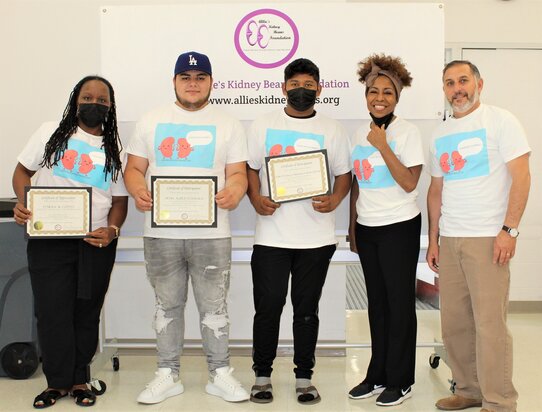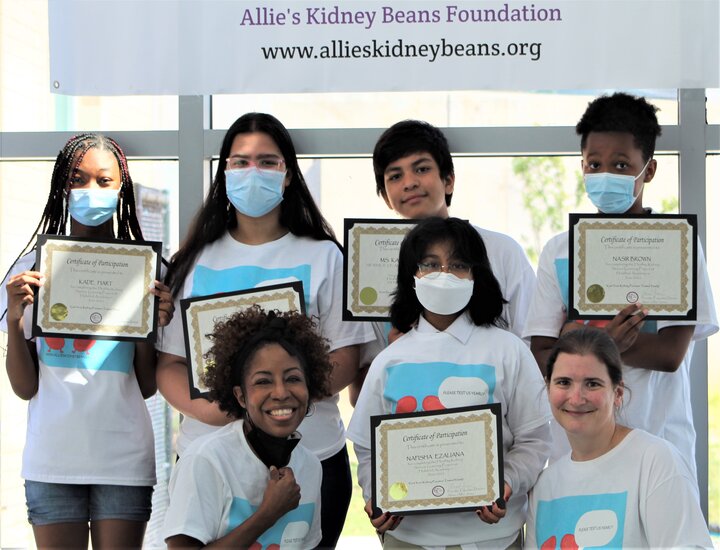The mission of this nonprofit is very personal for founder and executive director Alison (Allie) Jones. With a diagnosis of polycystic kidney disease at the age of 16, Allie is educating students on how they can avoid renal failure. Giant Food has supported Allie’s Kidney Beans Foundation through its Community Bag Program.
Tell us about Allie’s Kidney Bean Foundation.
Allie’s Kidney Beans Foundation (AKBF) was founded in 2014 while I was experiencing the beginning stages of renal failure. Our mission is to decrease the current minority health disparities in healthcare and all the causation factors that lead to kidney failure through advocacy and education. Unfortunately, minorities have the highest rate of renal failure based on health concerns and health complications.
Our mission is to decrease the current minority health disparities in healthcare and all the causation factors that lead to kidney failure through advocacy and education.
In my case, I inherited kidney disease, and my diagnosis at the age of 16 with polycystic kidney, liver and ovary disease gave me a very proactive approach. I was cautious about what I ate. I was very conscious of doctor’s appointments and yearly kidney function checks. By the time I went through renal failure, I had beat most of the odds because I prepared for a renal failure outcome. I wasn’t a diabetic, and obesity wasn’t a factor. However, hypertension accompanied my kidney disease, and that was something that I had to take into consideration.
What services do you provide to the community?
Before COVID, Allie’s Kidney Beans Foundation attended health fairs for education outreach. But now our focus is expanded to Service-Learning for community students. We’ve developed an online platform allowing students to receive Service-Learning graduation hours through our program virtually.
With this education, students create positive changes in lifestyle behaviors and kidney health that allow them to live longer and healthier lives. They’re sharing what they learn with family and friends, and most importantly, beginning a lifelong practice of proactive healthcare.
With this education, students create positive changes in lifestyle behaviors and kidney health that allow them to live longer and healthier lives.
What sets you apart from other organizations in your community?
Several nonprofits fighting kidney disease have existed for years. They are stellar in organizing support groups, funding treatment, and providing research, especially in the polycystic kidney disease field.
Allie’s Kidney Beans Foundation is a grassroots organization that focuses on student education—for example, we are listed as a service provider for Service-Learning students in Washington, DC. But students also find us on their own. Allie’s Kidney Beans Foundation works with Baltimore City and Baltimore County students. Our goal is to expand services into other states and countries—anywhere there are a disproportionate number of minority patients diagnosed with renal failure.

Tell us a story that illustrates the good work of your organization.
The most impactful story is about a student that found us in Washington, D.C., last summer. During the training program, we reviewed the causation factors that can lead to renal failure, including high cholesterol. One student was particularly interested in understanding the numbers for high cholesterol. I found she was not concerned for a family member but about herself.
At 16, she had high cholesterol, and she did not know that if she didn’t monitor her medical condition, she could have renal failure and need a kidney. She had no idea about the potential outcome of having high cholesterol. The fact that she contacted Allie’s Kidney Beans Foundation and learned about causation factors may have saved her from severe future health issues.
In my case, I waited 11 years for a new kidney and had both kidneys removed in 2019, followed by two years of hemodialysis. I finally received my new kidney in 2021. I want others to avoid going through a similar situation. But kidney transplants only occur if you are healthy enough to receive a new kidney and the organs are available.
What is your most outstanding achievement or contribution to the community?
I can be transparent and share what happened to me. A lot of people need help to do that. It’s a challenging and traumatic situation. Sharing my story validates what Allie’s Kidney Bean Foundation is all about.
With my lived experience, I can say this is why you should listen to me…why you should get a yearly kidney function tests whether you think your health is acceptable or if you’re having other health complications that have nothing to do with kidney problems. It would be best if you did the things to keep your body healthy. It’s not just a conversation; it’s a lifestyle.
Sharing my story validates what Allie’s Kidney Bean Foundation is all about.
What do you want people to know about Allie’s Kidney Bean Foundation?
The first is that the founder strongly believes that proactive healthcare far outweighs emergency healthcare. I knew that polycystic kidney disease would eventually deplete my kidney function. I didn’t know when. I didn’t know where or how. Therefore, annual nephrology appointments were essential.
The second is that the founder wants you to get your kidney function tested annually. Kidney failure has five stages; during stages 1 and 2, there are very mild symptoms; hearing a doctor say your kidney function is acceptable does not equate to a number. After a medical panel of tests, ask your physician, “What’s my kidney function?” Make sure you have a quantifiable percentage number out of 100.
Lastly, the third recommendation I want to leave audiences with is that I recommend everyone speak up/ask questions/discuss options for their medical condition. Get more than one opinion if necessary. If no one knows you’re sick or if no one knows you’re facing health challenges, no one can help you or support you or possibly guide you to multiple options for your diagnosis. So that takes shape by conversing with your family and community to gain access to resources, support groups and advocacy. All these tools are essential to managing health challenges.
How do you use the funds raised from the Giant Food Community Bag Program?
The funds Giant Food gives to Allie’s Kidney Beans Foundation are allocated for supplies and materials students need for our Healthy Kidney Service-Learning Program. Giant Food has directly impacted the students who go through our Healthy Kidney Program.
Is there anything you’d like to add?
Our program is not limited to Maryland. We can serve any school district in the United States where service learning is a graduation requirement. It would be great to see the next generation of kids not experience the health challenges endured by their family members having to receive dialysis treatment. I want students to see what life looks like through a healthy lens.

Alison (Allie) Jones is Founder and Executive Director of Allie’s Kidney Beans Foundation.
Published July 26, 2023.

